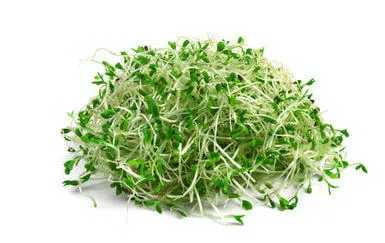
- Share on Facebook198
- Share on Pinterest
- Share on Twitter
The roots of the alfalfa plant (Medicago sativa) shoot down up to 30 feet into the ground, digging up minerals that are not found on the surface. For this reason, the Arabic word Alfalfa means “father of all foods.”
Alfalfa is loaded with vitamins, minerals and nutrients including:
- Vitamin A: This vitamin supports night vision, builds up resistance to infections, promotes growth and is important for healthy skin. It is essential during pregnancy.
- Vitamin B6: Vitamin B6 helps with digestion, protein and fat metabolism and promotes nerve and skin health. It also helps reduce nausea.
- Vitamin K: This vitamin is necessary for blood clotting and is important to optimal liver function. It may even contribute to vitality and longevity.
- Vitamin D: Vitamin D is necessary in order to regulate calcium and phosphorus in the body, and helps to form strong teeth and bones.
- Calcium: Calcium builds strong bones and teeth, assists in blood clotting, helps with endurance, relaxes nerves and regulates heart rhythm.
- Iron: Iron is required in the manufacturing of hemoglobin and helps carry oxygen in the blood.
- Potassium: Potassium is necessary for the nerves, heart, enzyme reactions, muscle tone and fat digestion.
- Chlorine: This essential electrolyte cleans and purifies the body and regulates the metabolism of fat, sugar and starch.
- Sodium: Sodium regulates fluid balance in the body, prevents blood from clotting, keeps the spleen functioning optimally and is important for the neutralization of acid and stomach and bowel functions.
- Silicon Magnesium: This mineral helps with constipation, nerves and stimulating brain function.
Fact: Alfalfa is also high in protein and contains 18.9% compared to beef, which contains 16.5%, eggs 13% and milk 3.3%.
Use Through the Ages
Turkish writings mention alfalfa in around 1300 BC and the Chinese have been using alfalfa medicinally for hundreds of years as an herbal remedy to treat numerous health conditions including blood, liver and bowel disorders, tooth decay, blood clotting problems, whooping cough, morning sickness and autoimmune disorders.
Ayurvedic medicine has used alfalfa to reduce water retention, ulcers and arthritis. Early American colonists fought scurvy with the plant as well as menstrual difficulties, urinary problems and arthritis.
Native Americans used the seeds as a thickener and nutritional additive. In the 19th century, America alfalfa was used as an ingredient in general wellness tonics. Seeds were often ground to make a poultice for insect bites and nursing mothers used the leaf to stimulate the flow of breast milk.
Sometimes called “buffalo herb” or “Spanish clover,” alfalfa is a member of the pea family and is a perennial flowering plant that is planted mainly for forage for cattle, and is normally harvested as hay. It has the highest nutrient quality of any common hay crops and is not often used for pasture but as a mixture with other pasture grasses to boost nutritional quality.
The good news is that alfalfa, the richest land source of trace minerals, although a favorite of horses, rabbits and cattle, is also great for humans.
Review of Recent Literature
A review of recent literature regarding the efficacy of alfalfa to treat a number of conditions has turned up favorable results. Some of the noted medicinal qualities are:
- Blood and liver purification
- Reducing arthritis pain
- Alkalizing the body
- Promoting healthy digestion and elimination
- Lowering bad cholesterol
- Urinary tract detoxification
- Lowering blood sugar
Alfalfa and Pregnancy
Author Lisa Goldstein, CPM, CNM, says that many discomforts in pregnancy can be alleviated with alfalfa tablets, including heartburn, constipation and morning sickness. Alfalfa tablets elevate the vitamin K levels of pregnant women, which helps reduce postpartum bleeding and increases vitamin K stores in newborns, which reduces bleeding problems for them as well.
 Alfalfa increases and helps maintain the milk supply and reduces swelling. It also keeps blood sugar levels consistent. Lisa warns that anyone who takes a blood thinner should be very careful with alfalfa because of the impact of the vitamin K.
Alfalfa increases and helps maintain the milk supply and reduces swelling. It also keeps blood sugar levels consistent. Lisa warns that anyone who takes a blood thinner should be very careful with alfalfa because of the impact of the vitamin K.
How to Take Alfalfa
There are many ways to enjoy the vast nutritional and medicinal benefits of this herb. You can purchase capsules, leaves for teas or use fresh sprouts for salads or soups. Just be sure you always choose organic.
Note: As always, we recommend consulting a professional physician or herbalist before starting any herbal treatment.
-The Alternative Daily
Sources:
http://www.nlm.nih.gov/medlineplus/druginfo/natural/19.html
http://www.ncbi.nlm.nih.gov/pubmed/20969516
http://www.ncbi.nlm.nih.gov/pubmed/9301421
http://www.ncbi.nlm.nih.gov/pubmed/22744951
Natures Medicine By Richard Lucas
Excerpted from “The Amazing Alfalfa,” by Lisa Goldstein, CPM, CNM; in Birth Wisdom: Tricks of the Trade Vol III
- Share on Facebook198
- Share on Pinterest
- Share on Twitter

